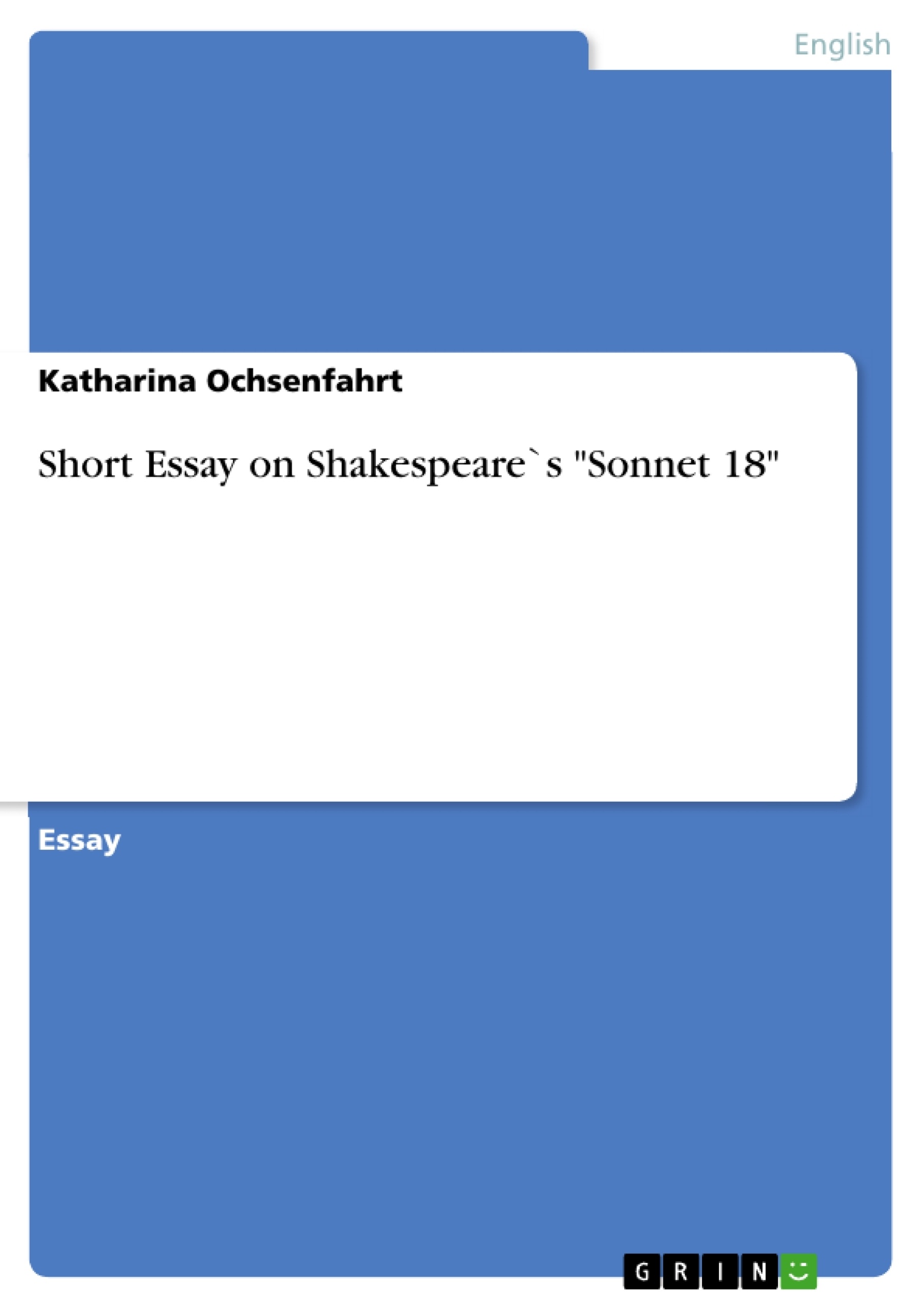William Shakespeare is a famous poet of the 16th century. He was born in 1564 in Stratfort on Avon and became famous as a playwrite in London at the famous Globe Theater. Shakespeare wrote his sonnets probably over a period of several years satarting in 1594. They were first published as a collection of 154 poems in 1609.
In his sonnet “18” William Shakespeare illustrates the beauty of the young man, who will be remembered forever because of this poem.
Table of Contents
- Introduction
- Shakespeare's Sonnets
- Sonnet 18: Analysis
- Rhetorical Question and Initial Comparison
- Imperfections of Summer
- Eternal Summer and Immortality
- The Power of Poetry
- Conclusion
Objectives and Key Themes
This essay aims to analyze William Shakespeare's Sonnet 18, exploring its structure, themes, and poetic devices. It examines how Shakespeare uses the sonnet form to immortalize the beauty of the young man addressed in the poem.
- The use of the Shakespearean sonnet form
- The contrast between the ephemerality of nature and the enduring beauty of the young man
- The theme of immortality achieved through poetry
- The use of rhetorical devices such as metaphor, personification, and repetition
- The exploration of love and beauty
Chapter Summaries
Introduction: This introductory section provides background information on William Shakespeare, his sonnets, and the context of Sonnet 18. It briefly discusses the typical structure of Shakespearean sonnets, the main characters often found within them, and the ongoing debate surrounding the autobiographical nature of the poems. The introduction sets the stage for a deeper analysis of the chosen sonnet.
Shakespeare's Sonnets: This section offers a general overview of Shakespeare's sonnets, highlighting their typical structure (three quatrains and a couplet), rhyme scheme (abab cdcd efef gg), and the iambic pentameter used in their composition. It also introduces the three main characters commonly found in the sonnets: the Fair Youth, the Rival Poet, and the Dark Lady, providing a broad context for understanding the relationships and themes explored within the collection. The section lays the groundwork for the subsequent detailed analysis of Sonnet 18 by explaining the conventions and common elements found in Shakespeare's sonnets.
Sonnet 18: Analysis: This section provides a comprehensive analysis of Shakespeare's Sonnet 18. It meticulously examines the poem's structure, focusing on how the three quatrains and concluding couplet work together to build the poem's argument. The analysis delves into the poet's use of figurative language, including metaphors (e.g., "summer's day," "eye of heaven"), personification (e.g., "death brag"), and repetition (e.g., "fair," "more"), exploring how these devices contribute to the poem's overall effect and meaning. The section carefully unpacks the poem's central theme of immortality, demonstrating how Shakespeare uses poetic craft to elevate the young man's beauty to a timeless status. The analysis carefully tracks the poem's argumentation, explaining the significance of each comparison and how the poem's conclusion builds upon the preceding stanzas. It explains how the poem's language and structure work together to achieve this effect, showing how the final lines of the sonnet synthesize the thematic ideas presented in the previous lines.
Keywords
William Shakespeare, Sonnet 18, Shakespearean sonnet, iambic pentameter, metaphor, personification, immortality, beauty, time, love, poetry, literary analysis.
Shakespeare's Sonnet 18: A Comprehensive Language Preview - FAQ
What is this document?
This document is a comprehensive language preview of an essay analyzing Shakespeare's Sonnet 18. It includes a table of contents, objectives and key themes, chapter summaries, and keywords. It's designed for academic use, supporting structured thematic analysis.
What topics are covered in the essay?
The essay focuses on a detailed analysis of Shakespeare's Sonnet 18. It explores the sonnet's structure, themes, and poetic devices, examining how Shakespeare uses the sonnet form to immortalize the beauty of the young man addressed in the poem. Key themes include the contrast between the ephemerality of nature and enduring beauty, the theme of immortality achieved through poetry, and the exploration of love and beauty.
What are the key themes of Sonnet 18 according to this preview?
Key themes in Sonnet 18, as analyzed in this preview, include the ephemerality of nature versus the enduring beauty of the young man, the achievement of immortality through poetry, and the exploration of love and beauty.
What poetic devices are discussed in the analysis of Sonnet 18?
The analysis discusses Shakespeare's use of various poetic devices in Sonnet 18, including metaphor, personification, and repetition. Specific examples are provided, such as "summer's day," "eye of heaven," and "death brag."
What is the structure of Shakespeare's sonnets?
The preview explains that Shakespeare's sonnets typically follow a structure of three quatrains (four-line stanzas) and a concluding couplet (two-line stanza). The rhyme scheme is abab cdcd efef gg, and they are written in iambic pentameter.
What is the essay's objective?
The essay aims to analyze William Shakespeare's Sonnet 18, exploring its structure, themes, and poetic devices. It examines how Shakespeare uses the sonnet form to immortalize the beauty of the young man addressed in the poem.
Who are the main characters often found in Shakespeare's sonnets?
The preview mentions three main characters commonly appearing in Shakespeare's sonnets: the Fair Youth, the Rival Poet, and the Dark Lady.
What is the significance of the introduction and conclusion?
The introduction provides background on Shakespeare, his sonnets, and the context of Sonnet 18, setting the stage for the analysis. The conclusion (though not detailed here) would likely summarize the findings of the analysis.
What are the chapter summaries?
The document provides summaries for an introduction, a section on Shakespeare's sonnets generally, and a detailed summary of the section analyzing Sonnet 18. These summaries detail the content and approach of each section of the essay.
What are the keywords associated with this essay?
Keywords include William Shakespeare, Sonnet 18, Shakespearean sonnet, iambic pentameter, metaphor, personification, immortality, beauty, time, love, poetry, and literary analysis.
- Quote paper
- Katharina Ochsenfahrt (Author), 2008, Short Essay on Shakespeare`s "Sonnet 18", Munich, GRIN Verlag, https://www.grin.com/document/151092



